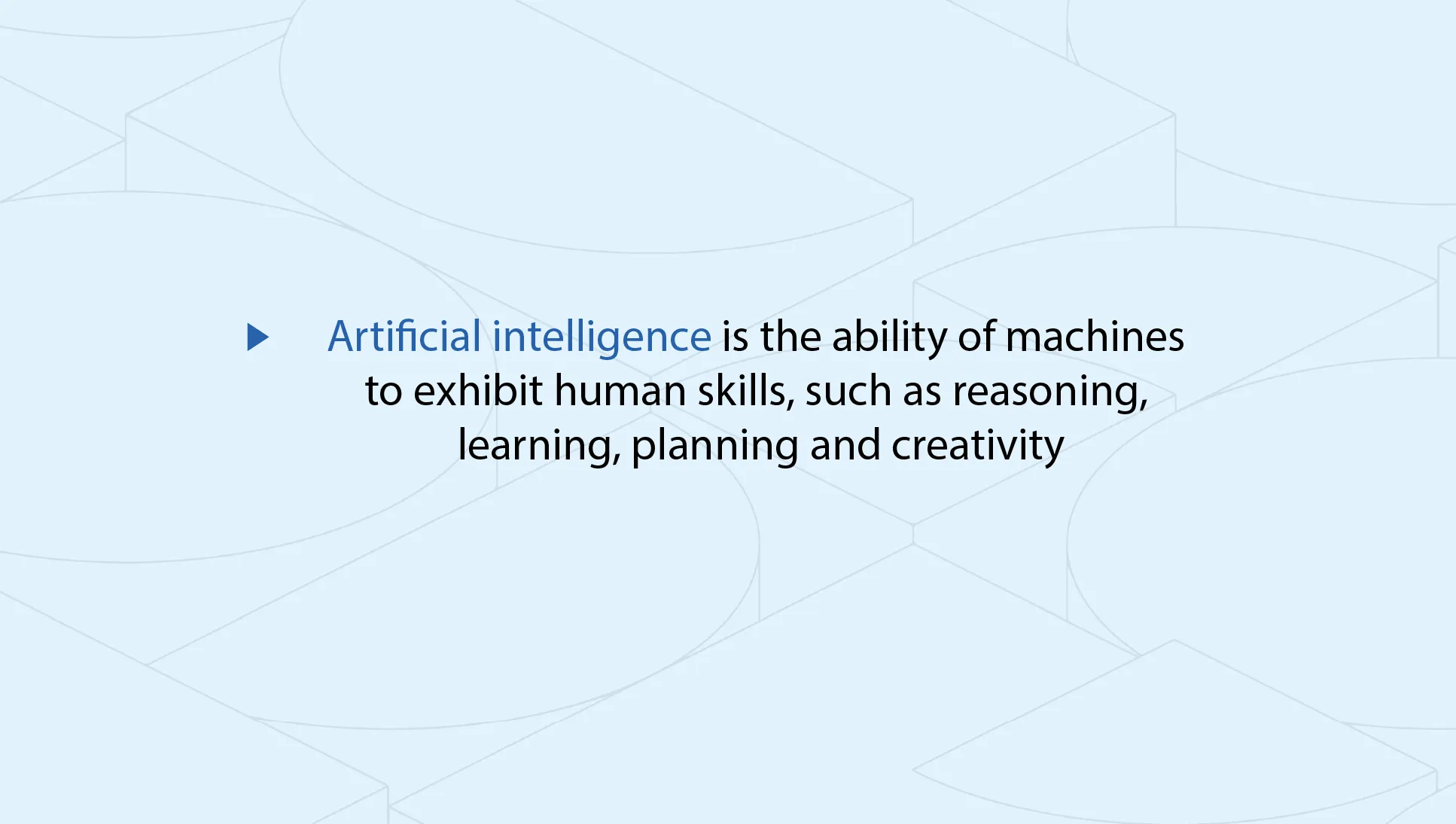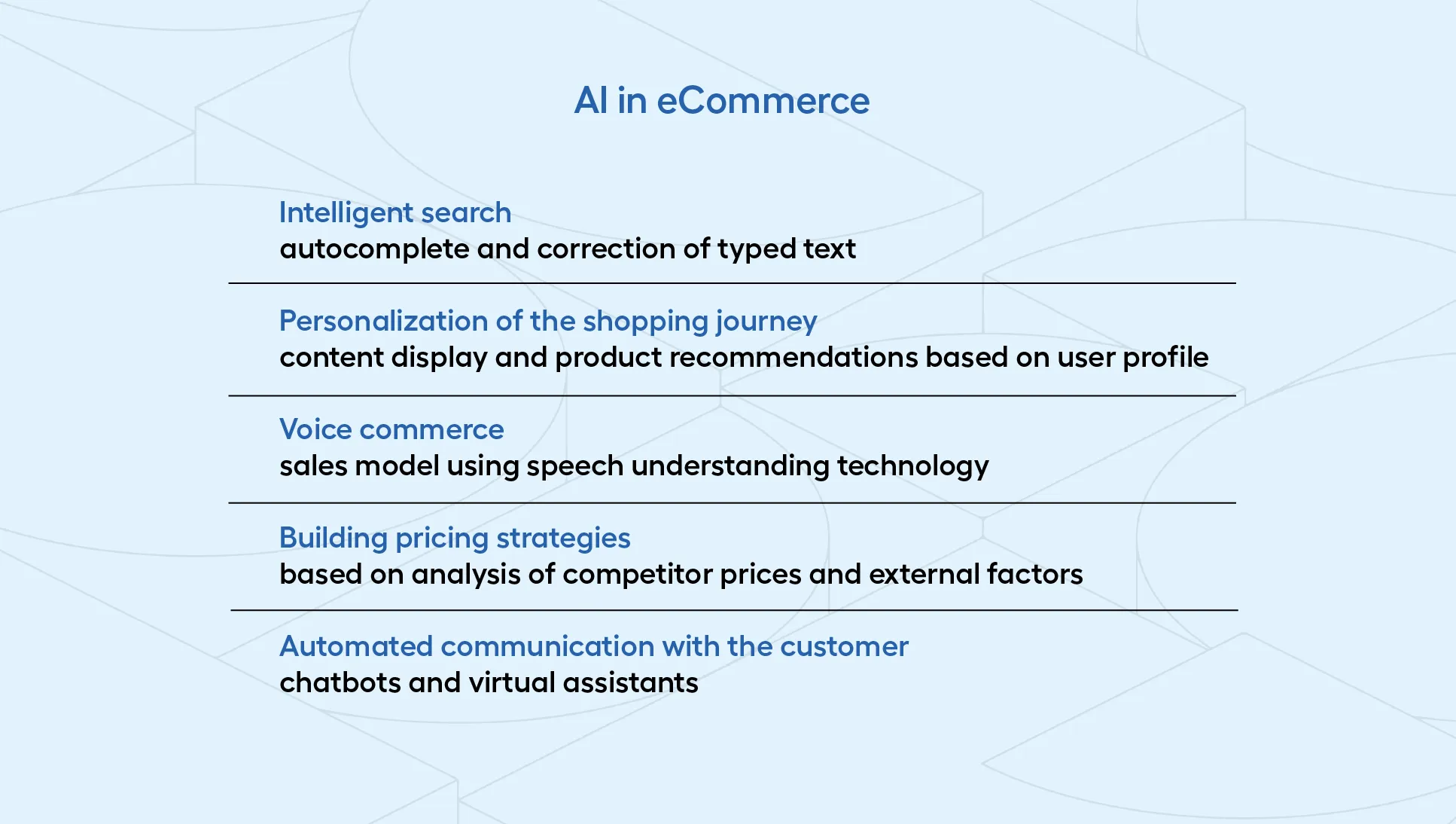Artificial intelligence in eCommerce - into the future at the click of a button
You hear the voice of a virtual consultant in your phone's earpiece, you unlock your smartphone using facial recognition, and a search engine on a website corrects your typos in advance - all this would not be possible without the development of artificial intelligence. Why is it being referred to as the 4th industrial revolution? How is artificial intelligence benefiting the eCommerce industry? Why should you introduce this technology to your online store? Answers to these questions - in our article, we invite you to read!
Starting from the scratch - what exactly is artificial intelligence?
While the term "artificial intelligence" may still sound surreal, it first resounded back in 1956, and just 10 years later a novel prototype chatbot premiered. Since then, innovations based on artificial intelligence have moved to the forefront - from self-service checkouts through electric cars to robots performing medical procedures. What exactly is artificial intelligence?

In a nutshell, artificial intelligence replaces the work of the human mind - how is this possible? Machine learning, which is the characteristic ability of a computer system to learn on its own, is responsible for most AI solutions. It concentrates its activities around the so-called Big Data - the collected data is first processed, and then appropriate algorithms and models are created based on it. Thanks to in-depth analysis of the data, the machine is able not only to perform specific tasks, but also to solve a completely new problem.
Thus, it is possible to handle many areas of a website without human input - personalizing an offer, detecting errors or ensuring SEO compliance. The aforementioned method requires high financial outlays, but despite this, companies are increasingly using machine learning, thus achieving proportionally high sales results.
AI takeover, or how does artificial intelligence affect eCommerce
Until recently, artificial intelligence technologies were reserved exclusively for business leaders. Today, there are ready-made tools on the market dedicated to smaller businesses - thus artificial intelligence is beginning to dominate the entire economy, with the eCommerce industry being a prime example. According to a SearchNode survey, as many as 96% of eCommerce store owners believe that AI positively affects their business. Chatbots or virtual assistants are actually already standard, but how else are AI-based systems being used in eCommerce? Examples - you'll find them below!

Price matters - building a pricing strategy using artificial intelligence
Did you know that Amazon changes the prices of its products on average every 10 minutes? It would seem that such an action only confuses the customer. Nothing could be further from the truth - dynamic price adjustment is part of a complex process that boosts revenue. The process involves constantly monitoring, analyzing and responding to competitors' prices using artificial intelligence.
The strategy of flexible product pricing allows the company to maintain its competitive position, optimal profit margins and long-term consumer relations. To do this, statistical data on not only the competition itself, but also external factors are used. The most common are studied:
- market demands
- price constraints,
- seasonality of products
- psychology of consumer behavior
An intelligent pricing system guarantees effective prediction of market behavior in response to sudden changes in the economic situation. Using a dynamic pricing model, Amazon has increased its profitability by 25%. It's worth reacting in time!
Tailor-made shopping - how does artificial intelligence help personalize sales?
Have you recently talked to friends about your vacation plans? Have you checked airfares on the Internet? Have you browsed sites with tourist attractions in the chosen city? Then you surely know very well that immediately your browser will start showing you attractive hotel deals. In the blink of an eye, you'll be fully ready for your trip - and you'll have been helped in your preparations by artificial intelligence.
Why is personalization in sales so important? Because it brings real results - studies conducted in major countries in Europe and North America have shown that as many as 65% of consumers are more likely to buy products presented in a personalized way. What's more, 40% of them declare that in such a situation they allocate a greater amount of money for purchases than planned. How do you provide personalized customer experience in eCommerce? Here are some examples that you can relate to your industry.
- Without a doubt, personalization is dominating the fashion industry - globally recognized retail chain ZARA has decided to use artificial intelligence to minimize returns. The brand created a tool that suggests the best-fitting clothing size to customers based on data on measurements, fashion preferences (e.g., the most common cut), and previous purchase history.
- Did it ever happen to you that you couldn't describe in words what you would like to buy, but in your imagination there was a clear vision of this item? A way out of a similar situation has been made possible by Asos - all you need is a photo, and the tool will search for similar products and suggest a selection of those closest to the ideal. The AI neurons used for this are able to recognize data both in the standard record and in the image, and such a process is already very close to the human way of learning.
- Personalization of messages sent to customers - in the form of newsletters, text messages or even social media notifications - is also an example of eCommerce support. Addressees are more likely to open emails in which the sender addresses them by name. Artificial intelligence allows you to take personalization one step further - it creates the content of an email based on location, gender, as well as previous purchase history.
Is it worth introducing this method of communication into your eCommerce? Reach Relevance's research shows that by all means, as personalization can increase sales up to 5 times.
Hey, Siri! Will you do my shopping for me? - voice commerce
We value saving time - especially on the Internet, where we can accomplish a lot with just a few clicks of the mouse. But what if we could minimize that effort even further and be able to do our daily shopping with a single voice command? Google, Apple and Amazon have been perfecting their virtual assistants for quite some time, and a new solution - voice commerce - is gaining popularity.
Voice-based shopping is only taking its first steps in the industry, but because it uses solutions familiar from traditional sales options, it is characterized by extremely rapid development. What else makes voice commerce so attractive? Unquestionably, the biggest advantage of this method is speed. We speak about 160 words per minute - far less we are able to convey in written form. Purchasing by voice also allows for completely contactless completion of the transaction.
Still, voice commerce faces some challenges. The most popular systems of this type require the use of dedicated devices such as Amazon Echo or Google Home. They represent an additional expense that may discourage potential users. The solution to the problem turns out to be reliable smartphones, which can be used to "contact" virtual Siri or samsung's Bixby, among others.
Voice recognition is still far from perfect - currently the error rate hovers around 60%. Mistakes are often made due to changes in the tone or pace of speech, which in turn frustrates customers. The biggest challenge, however, turns out to be the very approach to talking to an electronic device. This type of communication presents a barrier that is difficult to eliminate, especially for those born before 2000.
| Advantages of voice commerce | Disadvantages of voice commerce |
|---|---|
| Speed | High rate of speech comprehension errors |
| Possibility of contactless shopping | Need to purchase supporting devices, such as Amazon Echo |
| Intuitiveness | The psychological barrier of talking to a virtual system |
According to statistics, 80% of consumers are satisfied with purchases made via voice commerce. Large online stores are investing in the emerging technology, believing that it may gain ground in the near future. In Poland, Google is intensively testing this way of selling. Who knows - maybe shopping via voice will become part of your daily routine?
One step forward, or AI is the future
Billions of clicks, millions of transactions and thousands of online stores - analyzing all this data can be a huge challenge. Artificial intelligence is therefore essential to cope with this amount of information. It allows you not only to stay on top of market demands, but even to stay ahead of them. No matter what else artificial intelligence will surprise us with, one thing is certain - the demand for such technology in eCommerce will grow over time.
Want to sell intelligently? Bring modern solutions to your eCommerce!



